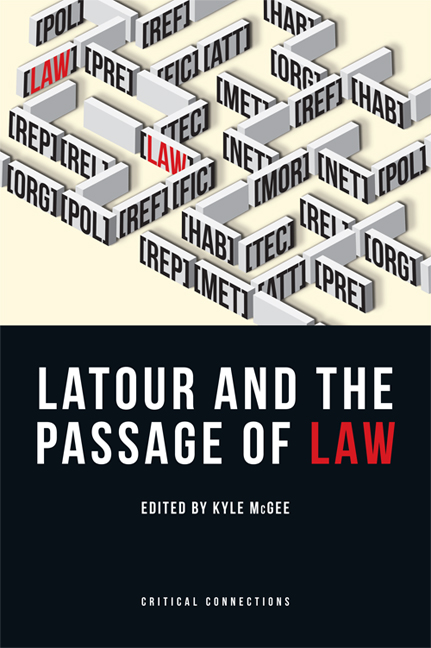Book contents
- Frontmatter
- Contents
- Introduction
- 1 From the Conseil d’État to Gaia: Bruno Latour on Law, Surfaces and Depth
- 2 Politics and Law as Latourian Modes of Existence
- 3 On Devices and Logics of Legal Sense: Toward Socio-technical Legal Analysis
- 4 ‘The Crown Wears Many Hats’: Canadian Aboriginal Law and the Black-boxing of Empire
- 5 Providing the Missing Link: Law after Latour's Passage
- 6 The Life and Deaths of a Dispute: An Inquiry into Matters of Law
- 7 Plasma! Notes on Bruno Latour's Metaphysics of Law
- 8 The Conditions of a Good Judgment: From Law to Internal Affairs Police Investigations
- 9 In The Name of the Law: Ventriloquism and Juridical Matters
- 10 Laboratory Life and the Economics of Science in Law
- 11 Bartleby, Barbarians and the Legality of Literature
- 12 The Strange Entanglement of Jurimorphs
- List of Contributors
- Index
2 - Politics and Law as Latourian Modes of Existence
Published online by Cambridge University Press: 05 September 2016
- Frontmatter
- Contents
- Introduction
- 1 From the Conseil d’État to Gaia: Bruno Latour on Law, Surfaces and Depth
- 2 Politics and Law as Latourian Modes of Existence
- 3 On Devices and Logics of Legal Sense: Toward Socio-technical Legal Analysis
- 4 ‘The Crown Wears Many Hats’: Canadian Aboriginal Law and the Black-boxing of Empire
- 5 Providing the Missing Link: Law after Latour's Passage
- 6 The Life and Deaths of a Dispute: An Inquiry into Matters of Law
- 7 Plasma! Notes on Bruno Latour's Metaphysics of Law
- 8 The Conditions of a Good Judgment: From Law to Internal Affairs Police Investigations
- 9 In The Name of the Law: Ventriloquism and Juridical Matters
- 10 Laboratory Life and the Economics of Science in Law
- 11 Bartleby, Barbarians and the Legality of Literature
- 12 The Strange Entanglement of Jurimorphs
- List of Contributors
- Index
Summary
At the time of this writing, Bruno Latour's loyal readership is still in the early stages of mastering his recent treatise, An Inquiry into Modes of Existence (hereafter Modes). In this work Latour presents a system of fifteen distinct modes of existence, each with its own three-letter abbreviation and, more importantly, its own truth conditions. The scientific criterion of adequate reference to an outside world must not be applied to other modes; this would amount to a simple category mistake. The reader cannot fail to notice that politics [POL] and law [LAW] are grouped with religion [REL] as the three modes pertaining to quasi-subjects. (By way of contrast, technology [TEC], fiction [FIC] and reference [REF] are the modes pertaining to quasi-objects.) In what follows, I will focus on Latour's distinction between politics and law, leaving religion and the other twelve modes for my forthcoming book on Latour's later philosophy.
One of the features that politics, law and religion share in common for Latour is their negative trait of being ungovernable by reference to objective facts in the outside world. It should already be clear to everyone that politics is not primarily an effort to ascertain objective truth. Most political controversies cannot be calmly and decisively settled by incontestable evidence, since most political ‘evidence’ can and will be contested ad infinitum until finally implemented by force. Nor can law be viewed primarily as an attempt to establish the true external facts of a given case. Many so-called facts in law are simply ‘taken as true’, and even the winning plaintiff can feel empty in victory, as if his or her truth-claim was not sufficiently appreciated by a favourable legal decision that aims at a different sort of resolution. Missed deadlines, botched paperwork, inadequate signatures and other apparent legal trivialities can derail an entire case. The same holds all the more for religion, whose claims surely cannot be verified by rigorous empirical inquiry. While for rationalists this is enough to disqualify religion altogether, for Latour it is merely a spur to determine what other sort of truth religion possesses, impenetrable to scientific research.
- Type
- Chapter
- Information
- Latour and the Passage of Law , pp. 38 - 60Publisher: Edinburgh University PressPrint publication year: 2015



